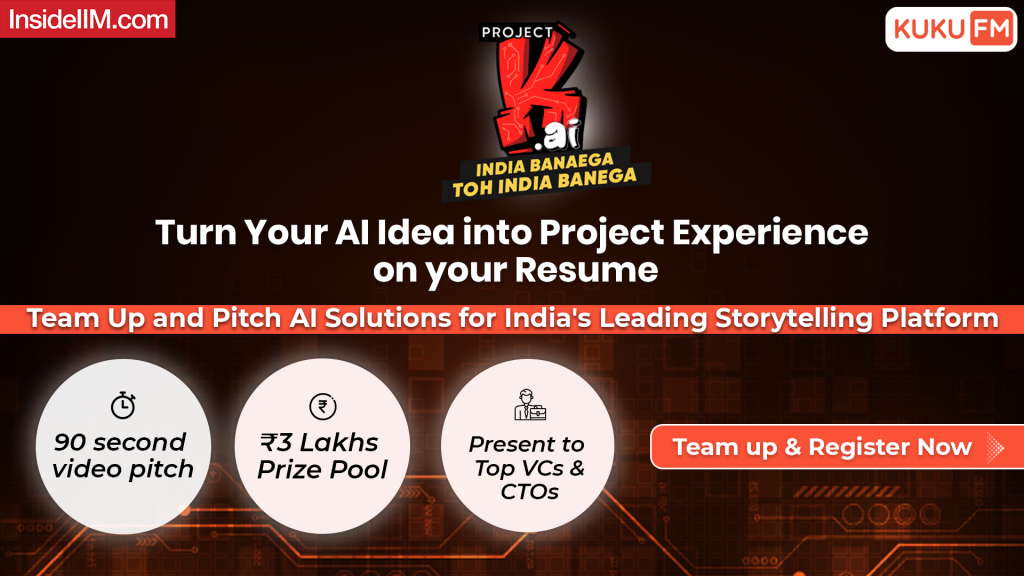


Barlee Kaur kicks off a new series on IIM Indore - Knowledge from IIM Indore.
You can check student series of IIM Indore - Icons of IIM Indore
In talk with the guru: Professor Srinivas Gunta talking about Indian Businesses and Icarus Paradox
Icarus was a figure in Greek mythology. One of the kings had imprisoned him on an alienated island without any fault of his. So on prayer to the almighty he was blessed with some kind of fashioned wings out of feathers and beeswax to escape from the island (Some stories suggest that he and his father were imprisoned and that his father fashioned the wings out of feathers apart from warning the son not to fly too close to the Sun). So enamored of his new found ability to fly, Icarus ignored warnings not to fly too close to the sun. Upon getting close to the sun, the beeswax melted, his wings fell off, and he plummeted to his death.

 As compared to examples of Icarus Paradox in world, what is India's relative position in terms of the number of occurrences?
It is very difficult to comment on it because no one would know whether something is an Icarus paradox a priori but only ex post facto. Also, I feel that if the company is doing something very innovative and it may fail we may say that it was overconfident, so that’s a challenge. Having said that, I believe that in the Indian context, the occurrence of Icarus Paradox may be lower, because, most of the time, businesses are family owned or family managed. So there is always an elderly generation which is advising over such matters and giving lessons from earlier instances such as “We have been there before, it did not work out alright then, this should not be the way to do things” etc. So I feel cases may be lower, but we cannot be too sure about it. The other way to argue about it is that the occurrence of instances may be very high, because I am not only the owner but I am also the manager so nobody can actually push me. However given the family structuring in the business the scope of Icarus paradox would be low.
As number of startups in India are trying to execute the successful models of the west, won’t that be a valuable argument for Icarus paradox number to be greater in the Indian context?
I don’t know what is so different about India that if I say I follow a western model in India it may fail. I don’t know if there is an overwhelming evidence to say that. However the only question is, in a globalized world, any startup can be born or made global. Just to say that even if Flipkart and Infibeam tried to be the Indian version of Amazon, Amazon can directly enter and as they have lot more expertise in doing things in the past, the chances of their success in India are higher. I am not too sure if we can relate this to Icarus paradox.
When is the magnitude of damage likely to be higher? For startup like business or for established giants?
If you are talking purely in terms of impact, a startup may be driven to bankruptcy and wiped out. If it is an established business, they may take a hit and move on. But I am assuming you will call it an Icarus Paradox only when they have burnt their fingers (originally feathers!). So, it may be a debilitating injury for instance in the case of both Jet airways and Infosys, but both are still surviving and doing well. However, Infosys has come down in the pecking order and it is no more considered the bellwether of the Indian IT industry. Jet airways used to be the market leader once upon a time. So I don’t know what should be the magnitude of damage to be considered an Icarus paradox - Do I need to have a bankruptcy risk? Not necessarily. You see quarter on quarter ratings falling down, so you will possibly step in and rectify the damage. For startups, they do not necessarily have shareholders or active investors unless it is a VC/PE funded firm, so chances of burnout are higher. With a startup where I am using family owned funds, there may be conservatism and the chances of burnout may be less.
Is there anything else you would like to suggest the future managers on what they should be cautioned about?
It is a good idea to have a small division within the firm, which will look at business models that can destroy my business models. Only then, I think I’ll be able to avoid Icarus paradox. If we look at Jack Welch, he started off the e-business initiative by asking all divisions to have a team that will be known as “destroy your business model or dyb.com. So, the idea was to figure out how a new startup will attack you or destroy you and do the same to your core business before any others. The teams formed their own websites to replicate the possible threat from web startups such as electronic marketplaces. This threat of course did not materialize but this had kept them alert of things that can take them aback.
PS: - The views expressed in the interview are that of the professor based on his understanding and research. They may not be consistent with received wisdom.
As compared to examples of Icarus Paradox in world, what is India's relative position in terms of the number of occurrences?
It is very difficult to comment on it because no one would know whether something is an Icarus paradox a priori but only ex post facto. Also, I feel that if the company is doing something very innovative and it may fail we may say that it was overconfident, so that’s a challenge. Having said that, I believe that in the Indian context, the occurrence of Icarus Paradox may be lower, because, most of the time, businesses are family owned or family managed. So there is always an elderly generation which is advising over such matters and giving lessons from earlier instances such as “We have been there before, it did not work out alright then, this should not be the way to do things” etc. So I feel cases may be lower, but we cannot be too sure about it. The other way to argue about it is that the occurrence of instances may be very high, because I am not only the owner but I am also the manager so nobody can actually push me. However given the family structuring in the business the scope of Icarus paradox would be low.
As number of startups in India are trying to execute the successful models of the west, won’t that be a valuable argument for Icarus paradox number to be greater in the Indian context?
I don’t know what is so different about India that if I say I follow a western model in India it may fail. I don’t know if there is an overwhelming evidence to say that. However the only question is, in a globalized world, any startup can be born or made global. Just to say that even if Flipkart and Infibeam tried to be the Indian version of Amazon, Amazon can directly enter and as they have lot more expertise in doing things in the past, the chances of their success in India are higher. I am not too sure if we can relate this to Icarus paradox.
When is the magnitude of damage likely to be higher? For startup like business or for established giants?
If you are talking purely in terms of impact, a startup may be driven to bankruptcy and wiped out. If it is an established business, they may take a hit and move on. But I am assuming you will call it an Icarus Paradox only when they have burnt their fingers (originally feathers!). So, it may be a debilitating injury for instance in the case of both Jet airways and Infosys, but both are still surviving and doing well. However, Infosys has come down in the pecking order and it is no more considered the bellwether of the Indian IT industry. Jet airways used to be the market leader once upon a time. So I don’t know what should be the magnitude of damage to be considered an Icarus paradox - Do I need to have a bankruptcy risk? Not necessarily. You see quarter on quarter ratings falling down, so you will possibly step in and rectify the damage. For startups, they do not necessarily have shareholders or active investors unless it is a VC/PE funded firm, so chances of burnout are higher. With a startup where I am using family owned funds, there may be conservatism and the chances of burnout may be less.
Is there anything else you would like to suggest the future managers on what they should be cautioned about?
It is a good idea to have a small division within the firm, which will look at business models that can destroy my business models. Only then, I think I’ll be able to avoid Icarus paradox. If we look at Jack Welch, he started off the e-business initiative by asking all divisions to have a team that will be known as “destroy your business model or dyb.com. So, the idea was to figure out how a new startup will attack you or destroy you and do the same to your core business before any others. The teams formed their own websites to replicate the possible threat from web startups such as electronic marketplaces. This threat of course did not materialize but this had kept them alert of things that can take them aback.
PS: - The views expressed in the interview are that of the professor based on his understanding and research. They may not be consistent with received wisdom.